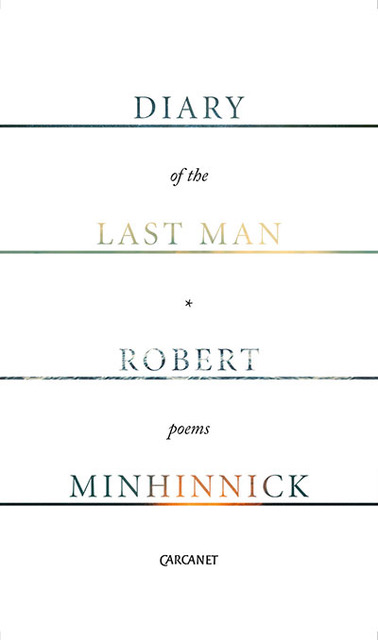Co-founder, and Charity Secretary, Robert Minhinnick has been shorlisted for the 2017 TS Eliot Prize.
Focus on Shortlisted Poet - Robert Minhinnick
Robert Minhinnick’s poetry has been influenced by his lifelong commitment as an environmental campaigner. He co-founded Friends of the Earth (Cymru) and became the organisation’s joint co-ordinator for some years. He is advisor to the charity, 'Sustainable Wales' and edits the international quarterly, Poetry Wales.
Robert Minhinnick was born in 1952 in South Wales, where he still lives. He is the prize-winning author of four volumes of essays, more than a dozen volumes of poetry and three works of fiction. His poetry collections include The Looters (1989) and Hey Fatman(1994), both Seren. A Selected Poems was published in 1999, followed by After the Hurricane (2002), King Driftwood (2008) and Diary of the Last Man (2017), all published by Carcanet. He has twice won the Forward Prize for Best Poem.
Reviews
“Robert Minhinnick's new collection confirms his status as one of the most important poets of these turbulent times. Bleakly elegiac, environmentally political, vital and visionary, his poems cast an extraordinary light over our darkening landscapes.”
- Carol Ann Duffy
“I am not vital to this world’, Robert Minhinnick declares in Diary of the Last Man. His new poetry collection is a hymn to ‘this world’, as well as a warning about what might happen if we continue to abuse our natural surroundings. It is also a complex meditation on the idea of home and belonging, explored through carefully crafted, and often extremely beautiful, poems. The first of these, a poem sequence, lends the collection its name. In the vein of much speculative fiction, Minhinnick imagines a post-apocalyptic world in which only a few people have survived…
“It is in observing these cycles of sea and river, human and animal, that Minhinnick most excels, and his collection as a whole is beautifully and acoustically attuned to what is most precious in our lives and around us.’
- New Welsh Review
“Minhinnick is one of the few poets who writes about a dockyard or a hedgerow with equal authority... A friend of mine once said that he liked to think of R.S.Thomas as ‘just being there’: outside the media hubbub, steadily producing wonderful poems. Although Minhinnick's considerably younger, and more cosmopolitan in scope, I'd say the same about him.”
- Poetry London
Poetry from Diary of the Last Man
'Morphine'
for Howard Bailey
All that’s in my head is in my head.
Try to notice Neptune, the poet said,
but there’s a mist outside, white on a white sky,
warm air across cold sea, turning the world invisible.
Morphine is a sister, is a saint.
In our blood and history they’ll trace the taint,
while all I see is the needle plunge,
or the golden-green, green-golden
draught in the eye-dropper
turning the world invisible.
Now a waitress brings the tables in.
I ask her for a napkin
and she comes across to the only customer
talking to himself and writing signs
like the moon and stars, the comet’s lines,
as if they could light up the gloom,
or the churning fret that hides the Seagull Room
and turns the world invisible.
I’m just the latest mad bastard to make her day.
But don’t worry, I’m not going to stay.
Yet all this dark matter is in my head,
and Howard, now you are forever dead,
and morphine’s still a sister and a saint
and an executioner. Too early for a cool carafe?
Let this eye-white fog then be your epitaph.
John Field Reviews the Shortlist: Robert Minhinnick
For the 2017 Prize, we’ve asked poetry blogger John Field to review the shortlisted titles again. This week, John concludes that Diary of the Last Man “presents an unsentimental, indifferent world, filled with cruelty and atrocity but, while there may be no Jesus in Minhinnick’s geology, there is no shortage of beauty and, filtered through the sands of his language, this beauty is arresting and memorable.”
In Diary of the Last Man, Robert Minhinnick meditates on environmental apocalypse before training his eye on Anglo-American atrocities in Iraq. Finally, he offers translations from Welsh, Arabic and Turkish. Minhinnick’s poems are a virtuoso display: reminiscent of Gerard Manley Hopkins or Dylan Thomas, bringing the sounds of Welsh poetry to English. He also writes with the force and indignation of Shelley’s ‘The Mask of Anarchy’ as he attacks the obscenities of war.
‘The Diary of the Last Man’ is a sequence of 23 poems, perhaps indicating that, for humanity, time is running out and will be cut short. Loneliness and uncertainty dominate as the speaker muses "Perhaps / I am the last man", with the line break highlighting his doubt as he hums his "hymn of sand". Minhinnick suggests the deadness of the world as the sands of time run fast through humanity’s emptying glass. "Hum my hymn of sand" repeats consonants in the same order, akin to Welsh cynghanedd, resulting in an arresting formality and beauty. The collection enjoys a Protean musicality as sounds morph and shift as they sift through Minhinnick’s hourglass: "Slack? / Slake? / Lake? / Meres and mosses and mirrors and mortuaries". Some might see environmental catastrophe as an unmitigated disaster but Minhinnick’s second poem, ‘Snipe’ presents "Two of them, two lines of barbed wire / across the sky, two voices" and, for once, humanity is outnumbered as nature begins to reclaim the planet.
Another sequence, ‘Mouth to Mouth: A Recitation Between Two Rivers’ alternates between prose and poetry and is reminiscent of William Dyce’s painting ‘Pegwell Bay, Kent – a Recollection of October 5th 1858’. Dyce’s figures scuttle, dwarfed by the geological strata in the cliffs and, above, Donati’s comet, with an orbital period of roughly 1,739 years, crosses the sky. Sand, "formal as fossils", drifts through Minhinnick’s poem and its shifting landscape renders it an "unchronicled country". The landscape is indifferent and insatiable as the dunes swallow human history and Minhinnick’s deer echo Ted Hughes’ ‘Roe Deer’: "two shamen praying to the lightning god, / or so they might well be in this unearthly light".
The ‘Amiriya Suite’ memorialises the bombing of an Iraqi public air raid shelter by the United States Air Force in 1991, killing hundreds of civilians. In the first part, end-stopped lines accent the poem’s cutting bitterness: "One body with four hundred souls / is exposed in a photographic flash. / They pick the wedding rings and wisdom teeth / from crematorium ash" and the facts of the event are re-read as obscene ironies: "Think of a smart bomb. / Not so smart". In the rest of the sequence, Minhinnick gives us unrhymed couplets, suggesting that nothing hangs together in a world of lies and sexed-up dossiers, where "a farmer had written nuclear formulae / on the skin of a watermelon".
Towards the end of the collection, his translations of Erozcelick Seyhan invite us to reconsider the temporal sands running through ‘Mouth to Mouth’ and the ‘Amiriya Suite’. Here, "we rise like incense through the sky, / people who become a plume of smoke". The translation echoes Psalm 141, "May my prayer be set before you like incense" but, for Minhinnick, "there is no Jesus in geology" and nature will just have to make do.
Diary of the Last Man presents an unsentimental, indifferent world, filled with cruelty and atrocity but, while there may be no Jesus in Minhinnick’s geology, there is no shortage of beauty and, filtered through the sands of his language, this beauty is arresting and memorable.


